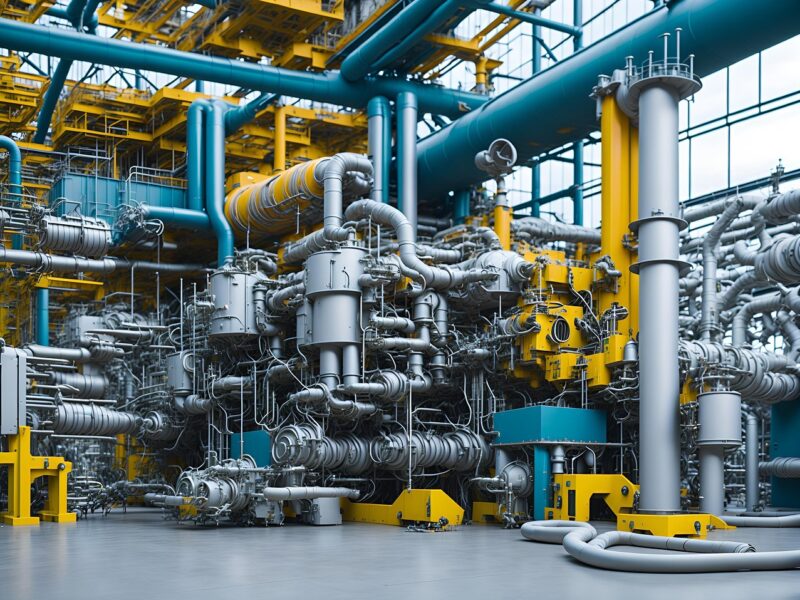Factory jobs in the USA have long been a cornerstone of the American economy, providing millions of workers with stable employment and competitive wages.
As the manufacturing sector continues to evolve, factory jobs in the USA remain a vital part of the workforce, offering opportunities for both skilled and unskilled labor.
Importance of Factory Jobs in the USA
Factory jobs in the USA play a critical role in the country’s economy, contributing significantly to GDP and employment. According to the Bureau of Labor Statistics (BLS), the manufacturing sector employs over 12 million workers, accounting for approximately 8% of the total workforce.
These jobs are spread across various industries, including automotive, electronics, food production, textiles, and more. The resurgence of domestic manufacturing, driven by factors such as supply chain disruptions and government incentives, has led to increased demand for factory workers.
This trend is expected to continue, making factory jobs a reliable career option for many Americans.
Types of Factory Jobs in the USA
Factory jobs encompass a wide range of roles, from entry-level positions to highly skilled technical jobs. Here are some of the most common types of factory jobs in the USA:
1. Assembly Line Workers
Assembly line workers are responsible for assembling products, operating machinery, and ensuring quality control. These roles often require minimal experience and provide on-the-job training.
2. Machine Operators
Machine operators handle and maintain equipment used in the production process. This role may require technical skills and familiarity with specific machinery.
3. Quality Control Inspectors
Quality control inspectors examine finished products to ensure they meet industry standards and company specifications. Attention to detail is crucial for this role.
4. Warehouse Workers
Warehouse workers manage inventory, load and unload shipments, and organize products within the factory. These roles are essential for maintaining efficient operations.
5. Maintenance Technicians
Maintenance technicians repair and maintain factory equipment to prevent downtime. This role often requires specialized training or certifications.
6. Supervisors and Managers
Supervisors oversee production teams, manage schedules, and ensure that production goals are met. These positions typically require prior experience in manufacturing.
7. Skilled Trades
Skilled trades, such as welders, electricians, and machinists, are in high demand in the manufacturing sector. These roles often require formal training or apprenticeships.
Salary Expectations for Factory Jobs in the USA
Salaries for factory jobs vary depending on the role, location, and level of experience. Here’s a breakdown of average annual salaries for common factory positions:
- Assembly Line Workers: 30,000−40,000
- Machine Operators: 35,000−50,000
- Quality Control Inspectors: 40,000−55,000
- Warehouse Workers: 30,000−45,000
- Maintenance Technicians: 45,000−65,000
- Supervisors and Managers: 60,000−80,000
- Skilled Trades (e.g., Welders, Electricians): 50,000−70,000
It’s worth noting that many factory jobs offer additional benefits, such as health insurance, retirement plans, and overtime pay, which can significantly increase overall compensation.
Top States for Factory Jobs in the USA
Certain states are known for their strong manufacturing sectors, offering abundant job opportunities and competitive wages. Here are some of the top states for factory jobs:
1. Michigan
Michigan is a hub for automotive manufacturing, with major companies like Ford, General Motors, and Chrysler headquartered in the state.
2. Ohio
Ohio has a diverse manufacturing sector, including automotive, aerospace, and food production industries.
3. Texas
Texas is home to a wide range of manufacturing industries, from oil and gas to electronics and machinery.
4. California
California’s manufacturing sector includes aerospace, technology, and food production, offering numerous job opportunities.
5. Indiana
Indiana has a strong presence in automotive, pharmaceutical, and heavy machinery manufacturing.
How to Land Factory Jobs in the USA
If you’re interested in pursuing factory jobs in the USA, here are some steps to help you get started:
1. Identify Your Skills and Interests
Determine which type of factory job aligns with your skills and career goals. For example, if you enjoy working with your hands, a role as a machine operator or maintenance technician might be a good fit.
2. Obtain Necessary Training or Certifications
While many entry-level factory jobs require no prior experience, obtaining certifications or completing training programs can make you a more competitive candidate. For example, welding certifications or forklift operator training can open doors to higher-paying roles.
3. Search for Job Openings
Use job search platforms like Indeed, LinkedIn, and Glassdoor to find factory job openings in your area. You can also visit the websites of major manufacturing companies to explore career opportunities.
4. Tailor Your Resume
Highlight any relevant experience, skills, or certifications on your resume. Even if you don’t have direct factory experience, emphasize transferable skills like teamwork, attention to detail, and problem-solving.
5. Prepare for the Interview
Research the company and practice answering common interview questions. Be prepared to discuss your work ethic, ability to follow instructions, and willingness to learn.
6. Consider Temporary or Seasonal Work
Many factories hire temporary or seasonal workers, which can be a great way to gain experience and potentially secure a permanent position.
Trends Shaping the Future of Factory Jobs in the USA
The manufacturing industry is undergoing significant changes, driven by advancements in technology and shifting economic conditions. Here are some key trends to watch:
1. Automation and Robotics
Automation is transforming factory jobs, with robots taking over repetitive tasks. While this reduces the need for some manual labor, it also creates demand for workers skilled in robotics and automation technology.
2. Reshoring
Many companies are bringing manufacturing jobs back to the USA to reduce reliance on foreign suppliers. This trend is expected to create new job opportunities in the coming years.
3. Sustainability Initiatives
Factories are increasingly adopting sustainable practices, such as reducing waste and using renewable energy. Workers with knowledge of green manufacturing practices may have a competitive edge.
4. Upskilling and Training Programs
As the industry evolves, employers are investing in upskilling programs to help workers adapt to new technologies and processes.
Conclusion
Factory jobs in the USA remain a vital part of the economy, offering stable employment and competitive wages for millions of workers. With a wide range of roles available, from entry-level positions to skilled trades, there are opportunities for individuals with diverse backgrounds and skill sets.
By staying informed about industry trends and investing in relevant training, you can position yourself for success in this dynamic field.
Whether you’re just starting your career or looking for a change, factory jobs provide a pathway to financial stability and professional growth. Start exploring opportunities in your area today and take the first step toward a rewarding career in manufacturing.






